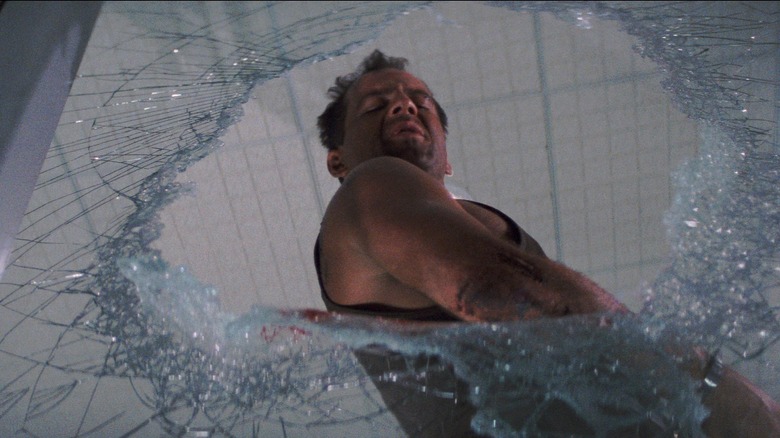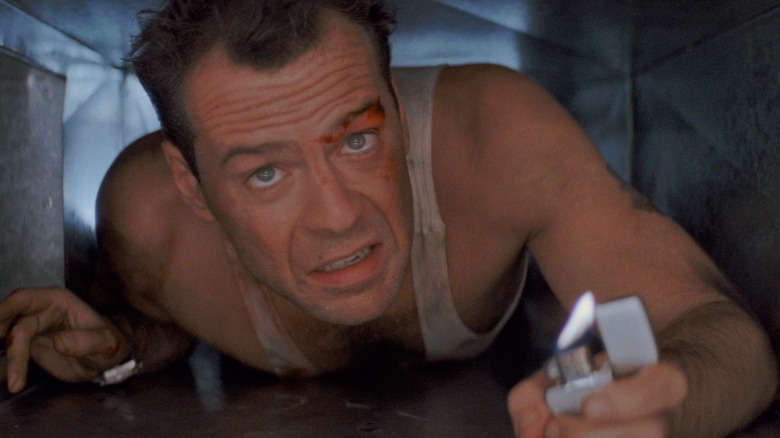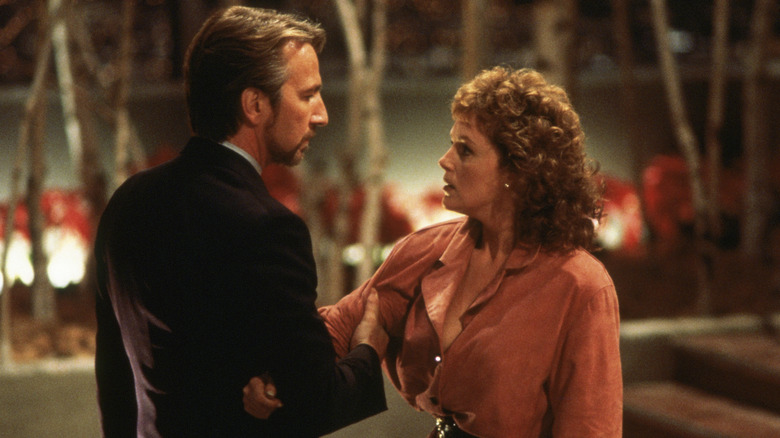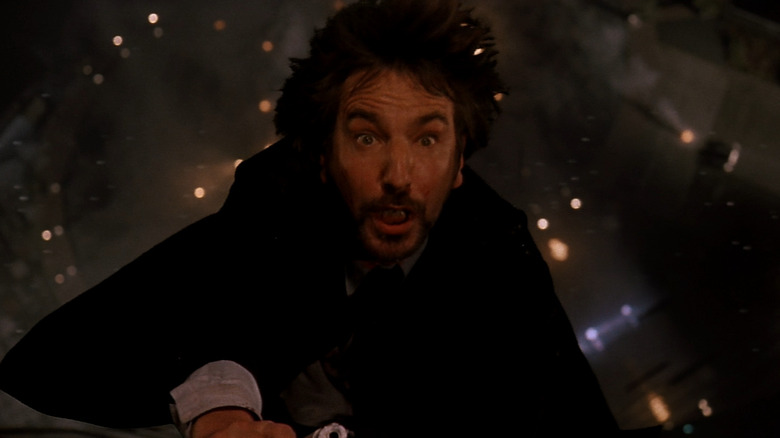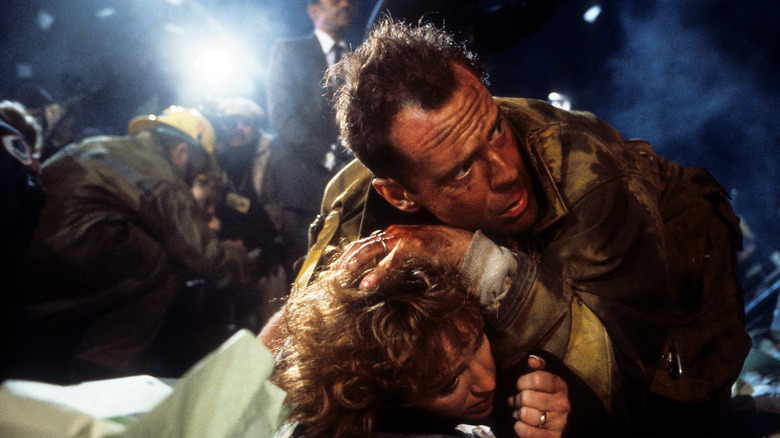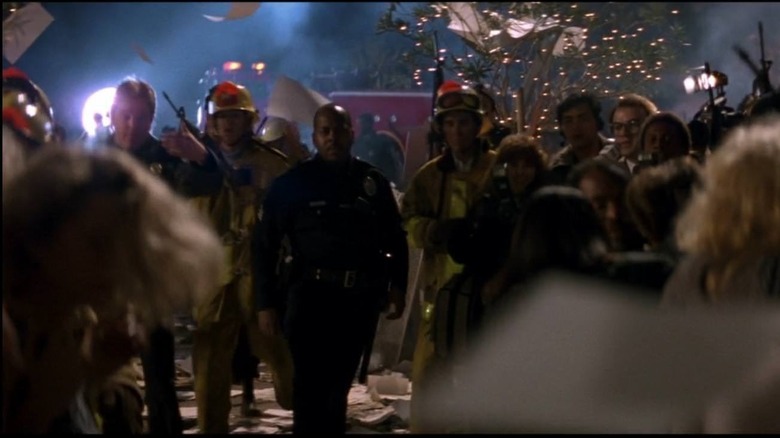Die Hard Ending Explained: It's Beginning To Look A Lot Like Christmas
"Die Hard" was released in the summer of 1988 and, in the more than three decades since its original run, has gone on to become one of the most beloved action movies of all time. It also turned Bruce Willis into a bona fide movie star and kickstarted a successful franchise, even if it ended up running itself into the ground. But all of that started with director John McTiernan's pitch-perfect masterclass of an action blockbuster. Today, we're going to discuss the movie's ending and why, aside from being a perfect button on a classic piece of popcorn cinema, it cements "Die Hard" as a great Christmas movie as well.
A Brief Recap
"Die Hard" centers on John McClane (Bruce Willis), who is visiting his estranged wife Holly (Bonnie Bedelia) and children on Christmas Eve at her place of business, Nakatomi Plaza in Los Angeles. John is a grizzled cop from New York, whereas Holly is a successful businesswoman whose business took her elsewhere. This has splintered the once-happy family, but John is doing his best to make amends with this holiday visit, starting with the Christmas party being thrown by Holly's company. Following a long flight, John decides to freshen up in Holly's office while she handles some things elsewhere. Taking the advice of someone he met on the plane, he takes his shoes off to rub his toes on the carpet. This proves to be a big mistake as a group of criminals arrive to shake up the party.
Led by the no-nonsense Hans Gruber (Alan Rickman) and his band of vaguely European, gun-toting henchman, they intend to break into Nakatomi's vault and steal the riches contained within. They are not terrorists with an agenda. They are not politically motivated. These are straight-up criminals who want money for money's sake, plain and simple. Little do they know, separated from the rest of the party, is McClane. The cop goes rogue without his badge, gun in-hand, and wearing a white tank top that's about to get very dirty and bloody, just like his bare feet. Hell yeah.
Welcome to the Party
John does an admirable job throughout "Die Hard," making his way through the band of armed criminals one-by-one. He even got himself a machine gun to even the odds (ho ho ho!). This came at a cost though, as McClane has expended most of his ammo, exhausted himself physically, and cut up his feet something fierce in an altercation with Hans and his remaining underlings. Thankfully, after stealing a radio from one of the formerly alive criminals, the everyman cop has been in touch with the police outside, namely Sgt. Al Powell (Reginald VelJohnson). Meanwhile, his poor limo driver Argyle (De'voreaux White) has been trapped in the parking garage, largely unaware of what has been going on inside.
Ultimately, the FBI makes the decision to shut off power to the building, which is exactly what Hans wanted, as this disables the safe, allowing them to get the bonds contained within. Playing further into Hans' hand, the FBI agrees to his demands and sends a helicopter to the roof, where they intend to kill the terrorists, with the idea being that there will be minimal hostage casualties. But McClane knows that Hans plans to blow the roof, which would kill everyone and allow them to escape with the loot. John manages to thwart the plan and save everyone from the roof (though not saving the roof itself), as well as seemingly taking out Gruber's fellow terrorist Karl. But a news report on the incident informs Gruber that Holly is, in fact, John's wife. Gruber then takes her hostage, setting the stage for the finale.
McClane vs Gruber
With the hostages saved, John goes to find his beloved Holly. Unfortunately, John is even more exhausted, wounded, and doesn't have much ammunition. Just two bullets remain for the final showdown. McClane, using his last bit of wit, acts as though he is surrendering to Hans and his remaining goon, but little do they know this determined cowboy has taped his trusty pistol to his back. Just as Hans is getting ready to shoot John, he pulls the pistol from his back and, with expert precision, kills Gruber's final henchman and wounds the big boss.
Unfortunately, Gruber isn't dead yet, and he's not about to go out on his own. He crashes through a window near the top of Nakatomi and grabs onto Holly's watch. Dangling from the building, Holly is in danger of going down with him. Yet, John unclasps the watch and, in one of the most memorable deaths in cinema history, Hans falls from the skyscraper with a look of pure, true panic on his face. Yippe ki-yay!
But Wait, There's More!
As things are wrapping up, Holly punches the dickhead newsman Thornburg, and John finally meets Al. However, Karl is actually alive and emerges, ready to kill both Holly and John. But Al draws his gun and saves the day. This serves as a bit of a redemption arc for him after suffering a tragedy in the field earlier in his career, shooting a young kid in the line of duty. Argyle, who helped thwart the criminals' escape by smashing into their van in the parking garage, rolls up and escorts Holly and John away as he wonders how this company parties on New Year's, given the events of the evening. Credits roll, "Let It Snow" plays, and action movie history is made.
A Christmas Miracle
For as much as we can discuss the nuances of what makes "Die Hard" great — the deceptively simple structure, its incomparable efficiency, an all-time great villain — perhaps the movie's greatest legacy is one of debate in the annals of cinema history. Namely, there are those who consider it a Christmas movie, and those who don't. One of the major takeaways from the movie's ending is that all of the thematic elements of a great holiday classic are in play, they are just disguised by lots of action and other such happenings. But there is an argument to be made that this is indeed a Christmas movie, and not just because it happens to take place around the holiday.
What do we want out of a holiday movie? Family, conflicts, lessons learned, a happy ending and, if possible, something we can watch repeatedly on an annual basis without it growing old? "Die Hard" has all of that. John and Holly love one another but their marriage was fractured by life's journey. It was ultimately the holiday that brought them back together, and they had to go through this turbulent experience with one another to get there. It allowed John to demonstrate, in a pretty extreme way, just how much Holly and his family mean to him. Love was rekindled as a result of this unorthodox Christmastime experience.
While the underrated "Die Hard: With a Vengeance" would once again throw their marriage into trouble, John learned lessons about what is most important to him and the experience brought him back together with his family. Lessons were learned through conflict, brought on by the holiday season. And yes, ultimately, we got a happy ending with a classic Christmas song needle drop along with it. No matter what camp one falls into, I surely don't have to convince anyone of this movie's re-watchability factor. There's a reason, 33 years later, we're still talking about it so fondly.
Am I going to end this debate the internet loves to have? No, I am not. However, I think the biggest argument in favor of "Die Hard" being a Christmas movie is contained within the movie's ending, if you know where to look.
Thinking about binge-watching all of the "Die Hard" movies? You can find every one of them on a various streaming platforms.
